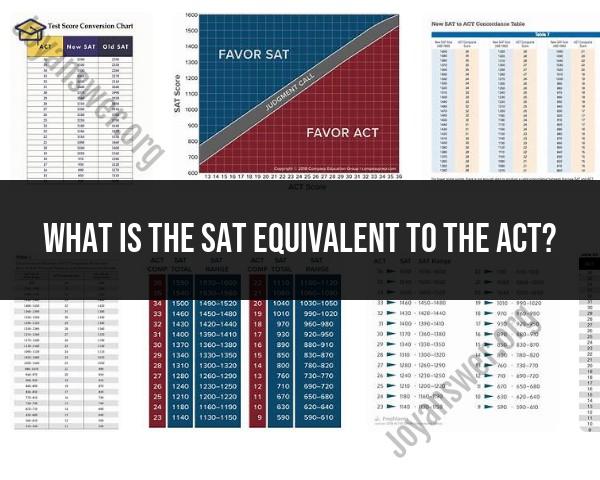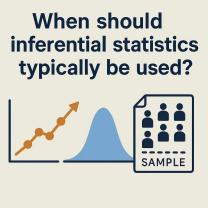What is the SAT equivalent to the Act?
The SAT and ACT are two different standardized tests commonly used for college admissions in the United States. They have different scoring scales, content, and formats, so it's not straightforward to determine an exact equivalence between the two. However, many colleges and universities accept both SAT and ACT scores and consider them equivalent for admissions purposes. Here are some general guidelines for understanding the equivalency between the SAT and ACT:
Score Comparison: Most colleges and universities that accept both SAT and ACT scores will provide guidelines for converting one set of scores into the equivalent of the other. These conversion tables or concordance tables are typically available on the respective test websites and can help you understand how your scores on one test compare to the other.
Percentile Rankings: You can also compare your percentile ranking on each test to get a sense of how your performance compares to other test-takers. For example, if you score in the 90th percentile on the SAT, your performance is roughly equivalent to scoring in the 90th percentile on the ACT.
Content and Format: Keep in mind that while SAT and ACT scores are used interchangeably by many colleges, the tests themselves are different. The SAT has three main sections (Evidence-Based Reading and Writing, Math, and an optional Essay), while the ACT has four sections (English, Math, Reading, and Science, with an optional Writing section). Your strengths and weaknesses in various subjects may influence which test is a better fit for you.
College Requirements: Some colleges may have a preference for one test over the other, so it's important to research the admissions requirements of the schools you're interested in to determine if they have a preference for SAT or ACT scores.
Optional Writing Sections: Both the SAT and ACT offer optional essay or writing sections. Some colleges may require or recommend these sections, while others do not consider them in the admissions process. Be sure to check the policies of the specific colleges you're applying to regarding the writing sections.
Super Scoring: Some colleges practice super scoring, which means they consider your highest section scores from multiple test sittings. This can be advantageous if you've taken the SAT or ACT multiple times.
Ultimately, the best way to determine the equivalence between your SAT and ACT scores is to use the official conversion tables provided by the test makers and to check the admissions requirements of the colleges you're interested in. Additionally, consider your own strengths and preferences in terms of test content and format when deciding which test to take. Many students perform similarly on both tests, so it's worth taking practice exams for both the SAT and ACT to see which one you are more comfortable with.
SAT Equivalent Scores for ACT: Understanding the Conversion
The SAT and ACT are two standardized tests that are widely used for college admissions in the United States. The SAT is scored on a scale of 400 to 1600, while the ACT is scored on a scale of 1 to 36.
There is no direct conversion between SAT and ACT scores. However, the College Board, which owns the SAT, provides a concordance table that shows the approximate SAT equivalent scores for ACT scores. The concordance table is based on the performance of students on both tests.
Here is a sample of the SAT equivalent scores for ACT scores:
| ACT Score | SAT Equivalent Score |
|---|---|
| 36 | 1570-1600 |
| 35 | 1530-1560 |
| 34 | 1500-1520 |
| 33 | 1470-1490 |
| 32 | 1440-1460 |
It is important to note that the SAT equivalent scores for ACT scores are just approximations. The actual SAT score that a student receives may vary depending on their individual performance on the test.
Comparing SAT and ACT Scores: How They Stack Up
The SAT and ACT are both comprehensive tests that measure a student's college readiness. However, there are some key differences between the two tests.
The SAT is more focused on verbal and math skills, while the ACT also includes a science section. The SAT also has a longer writing section than the ACT.
In general, the SAT is considered to be a more difficult test than the ACT. However, some students may perform better on one test than the other, depending on their individual strengths and weaknesses.
Navigating College Admissions: Converting SAT Scores to ACT and Vice Versa
When applying to college, students may be asked to submit their SAT or ACT scores. Some colleges may also accept both scores.
If a student only has one test score, they may need to convert their score to the other test in order to meet the requirements of the college they are applying to.
The College Board provides a conversion tool that students can use to convert their SAT scores to ACT scores and vice versa. The conversion tool is based on the performance of students on both tests.
Tips for Converting SAT Scores to ACT and Vice Versa
When converting SAT scores to ACT and vice versa, it is important to keep the following tips in mind:
- The SAT and ACT are two different tests, so there is no perfect conversion between the two.
- The conversion tool provided by the College Board is just an approximation. The actual score that a student receives may vary depending on their individual performance on the test.
- Students should check the admissions requirements of the colleges they are applying to to see if they need to submit a specific test score.
- If a student is unsure which test to take, they should talk to their guidance counselor or college advisor.













